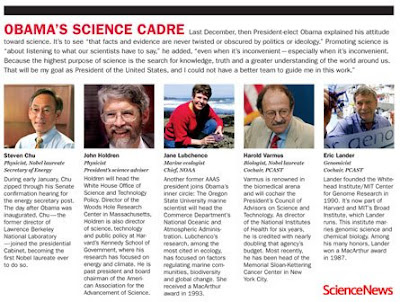
Check out Obama's science team here.
Science News:
The research community appears optimistic that the new president will follow through with as much as Congress allows. Many experts say they are impressed with the cadre of politically astute science and biomedical advisers that President Obama has already mustered to work for his White House and with Congress.
No surprise to anyone, “The real problem is going to be the economy,” observes physicist Leon Lederman, a Nobel laureate and former director of the Fermi National Accelerator Laboratory in Batavia, Ill.
Federal funding for science has been eroding over the past eight years, Lederman says. Meanwhile, the nation is in a recession, continues to direct huge sums of money into overseas wars and the importation of oil, faces an expected $1.2 trillion budget deficit this year, and strains under a national debt exceeding $10.6 trillion.
Against that backdrop, Lederman believes that reversing federal funding trends in science and engineering will prove a challenge. However, he adds, based on conversations with his former senator, Obama, “I’m convinced that he has an unusual grasp of science. Not that he can write down a differential equation. But Obama understands science in a deep way and reveals it by commenting on the beauty of new discoveries.
“To me, he deserves three checks for clearly understanding the power of science.”
And that, Lederman argues, is why Obama’s inauguration brought him a genuine sense of hope: “It feels like the marines are arriving — and just in time, hopefully.”
Health | A shot in the arm
The first wave of those marines has been dropping from the skies in what have been termed “parachute teams.” Beginning immediately after election day, the Obama transition advisers dispatched small groups to study federal agencies — through interviews with staff and talks with outsiders who monitor federal activities. The goal: to investigate not only what Uncle Sam has been charged with doing but also what major obstacles exist to carrying out those charges.
Some parachutists dropped in on Mary Woolley and her colleagues at Research!America. Woolley’s team, based in Alexandria, Va., has been documenting declining federal investment in biomedical and health research, and the impacts of that decline. She offered Obama’s team the following assessment of the big picture:
With an estimated one-in-six Americans lacking health insurance, a key campaign issue in 2008 was how to help people qualify for affordable insurance even if they’d lost their jobs.
Medical costs have continued to spiral upward while nearly every other economic indicator has fallen. Crucial to reining in costs will be smarter use of health resources — be they physician access, medicines, diagnostic procedures or patient data, Woolley explains. The health care industry would work more efficiently now if it knew how to, she contends. Read the rest.